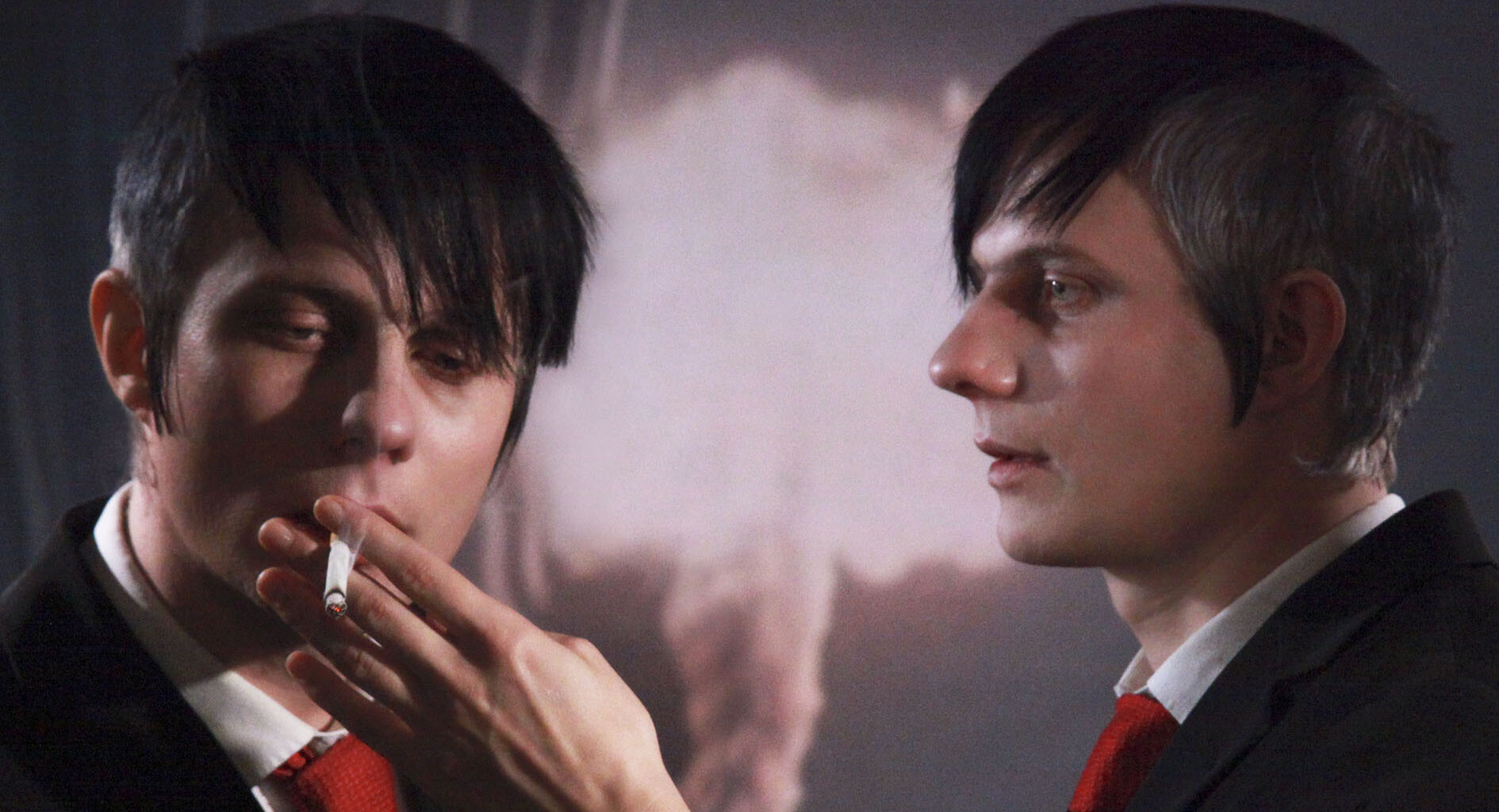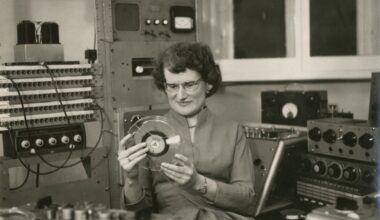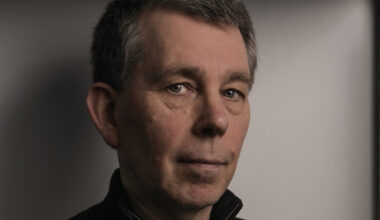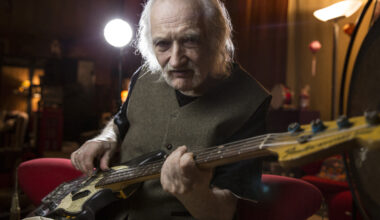The underground Tape Scene of early 1980s Germany produced countless DIY artists whose exciting and experimental work sounds as fresh today as it did then. And at its heart was electronic pioneer Felix Kubin, curator of the tape-tastic ‘Science Fiction Park Bundesrepublik’ compilation
“The cassette tape was comparable to the Xerox machine,” declares Felix Kubin, a German electronic musician whose sensibilities are deeply rooted in the past – and in past generations’ hopes about what the future would be like. “You could create copies of your work really cheaply and quickly.”
Kubin has released a slew of albums through his Gagarin record label since he first emerged with his teenage punk unit Die Egozentrischen 2 in the early 1980s. With a huge catalogue of work to his name – including soundtracks and radio plays – he is a composer who operates firmly in the world of art rather than commerce. It’s no surprise that he considers himself a Dadaist by trade.
“There was a punk bar in Hamburg called Marktstube,” he continues. “A lot of the local protagonists would gather there and play tapes of their newest home recording creations to each other. That’s how Alfred Hilsberg of ZickZack Records got to know some of the music he later released. The tapes were played and discussed, sometimes in such a controversial way that it would end up in a brawl. Those times were rough! But they were characterised by social encounters, not just anonymous internet comments.”
The almost Masonic world of tape meets and swaps that Kubin is describing seems like a million years ago. Audio cassette tapes, like the comparatively sized iPod of today, were beautifully robust and portable. You could cart a stack of tapes from place to place in a rucksack, whereas vinyl was heavy and brittle and awkward to carry. At the same time, the invention of the Sony Walkman gave people the freedom to hear what they wanted, where and when they wanted, destroying the monopoly on listening habits that radio had enjoyed since the first portable transistor sets had appeared decades before.
From the 1970s, the music industry got jittery about the audio cassette because it allowed users to record more or less anything onto a blank tape. Vinyl, by contrast, still required a factory to etch each slab of plastic. “Home taping is killing music” warned countless adverts and stickers – and it is probably true that this marked the start of a sharp decline in vinyl sales, with more and more listeners copying their friends’ stuff without paying for it themselves. But at the same time, as evidenced by ‘Science Fiction Park Bundesrepublik’, Felix Kubin’s recent compilation album on Finders Keepers, home recording gave birth to a raft of artists who chose to document their own music on humble cassette tapes. No longer did a band need to head into an expensive studio to lay down tracks. Now they needed nothing more than a basic four-track and a batch of ideas.
The result was a sudden surge of artists with an edge and a sense of spontaneity and a rough urgency that the mainstream lacked. Killing music? Not exactly.
Tape scenes developed pretty much anywhere that C60s and record buttons could be found, but the German kassettenkultur pioneers has a mystique that stands them apart from other home recording artists elsewhere in the world. To understand why this was the case, we need to hit rewind and stop at the tail end of the 1970s, back during some of the heaviest frosts of the Cold War.
“We all thought there would be an atomic war and the end of the world was near,” reflects Felix Kubin. “And here in Germany, we thought that we’d be the first ones to be eradicated. So why bother about common forms of composition and accessibility?”
The music that was produced in a divided Germany during the late 1970s and early 1980s was among the most thrilling sonic developments of the 20th century. This was an era when whole new genres and new musical aesthetics were formed.
“It felt a bit like a ground zero for German pop music,” notes Kubin. “There were so many brilliant things happening at the same time that one could hardly catch up with the latest releases. Just think of Deutsch Amerikanische Freundschaft, Einstürzende Neubauten, Tödliche Doris, Palais Schaumburg, Der Plan, Wirtschaftswunder, Liaisons Dangereuses… their inventiveness still resonates today. Yes, you had bands like Can, Neu! and Faust in the early 1970s, but they were mostly successful abroad rather than at home.”
The list of bands that emerged in the wake of what we now know as krautrock heralded an exciting burst of creativity and focus both in Germany and elsewhere. Many would go on to cross-pollinate their members in multiple line-ups to explore ever more inventive concepts. It’s no surprise that the likes of Nick Cave and Simon Bonney from Crime & The City Solution recruited musicians for their respective groups from Germany.
Late 1970s Berlin in particular was seen as a hugely important source of ideas, a fusion of music, film and art, an ongoing exchange of artistic explorations that prompted UK labels like Mute, Some Bizarre, 4AD and Rough Trade to try to pick up as many German bands of the day as they could for receptive British audiences. If that period seemed to generate a dizzying number of exciting groups, it was nothing compared to what followed soon after, where the advent of accessible home recording equipment made the creation and distribution of music possible for anyone with a simple tape recorder.
“Everyone could go crazy in their cellars,” says Kubin succinctly. “It seems as if there was a lot of pressure in the kettle in the German collective subconscious. I think this had a lot to do with our history and the vacuum of culture and intellectualism after the Second World War.”
Heightened tension inevitably leads to an explosion of some sort. In London and New York, the tension was economic misery and the explosion was punk. In Germany, the result was bands taking punk’s DIY aesthetic to the extreme, producing a remarkable tape scene that sounds every bit as fresh and intriguing today as it did at the time.
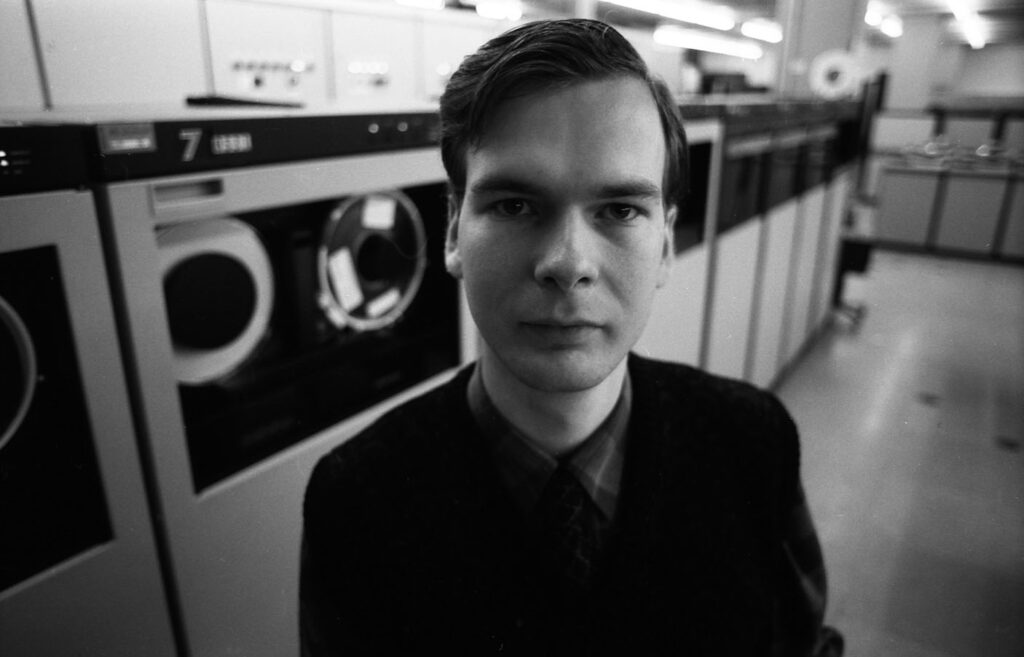
Felix Kubin’s ‘Science Fiction Park Bundesrepublik’ compilation contains 25 tracks hand-picked by Kubin in his capacity as curator and authority on the German tape scene, the material having been originally recorded and issued on cassette in limited quantities. The kassettenkultur overlapped with the emergence of bands like DAF and Palais Schaumberg and many members of established outfits also knocked out their own tapes. This is documented on ‘Science Fiction Park Bundesrepublik’, which includes tracks from Pyrolator (aka Kurt Dahlke from DAF and Der Plan), Holger Hiller (of Palais Schaumberg) and CHBB (the late Chrislo Haas and his Liaisons Dangereuses partner Beate Bartel, who was also in Einstürzende Neubauten).
“They didn’t have to make a huge step into those dark areas of the tape scene,” reveals Kubin. “The audio cassette was just a quick method to get things recorded without having to rent a studio. Chrislo and Beate released their tapes while they played gigs and had records out with Liaisons Dangereuses. Beate told me they did it because they were so hyper-productive and because they wanted to earn a bit of money on the side.”
Like a lot of underground movements, the history of tape music is filled with rare and sought-after releases. Kubin notes that some cassettes from the period can now fetch up to €400 because of the fervency with which hardcore fans approach collecting these artefacts.
“There was one release that was especially hard to find – Holger Hiller and Thomas Fehlmann’s interpretation of Paul Hindemith’s ‘We Build A City’, a concert for kids composed in 1930,” he says. “It originally came out as a tape on Warning, a precursor of Ata Tak Records from Düsseldorf. In the end, I had to put it out myself. I am generally not such a hunter for rarities. I am not a collector. I see all sound carriers as a means of exchange between like-minded people and I believe the price for this exchange should be affordable.”
Felix Kubin’s own approach to music was informed by witnessing performances by the likes of DAF on his television set around the time that he became a teenager. And like many electronic musicians growing up in the early 1980s, it was the changed role of the synthesiser that fired his imagination.
“I was excited about the minimalism, the disharmonic intensity, the playfulness and the electricity of what I heard,” he says. “This was finally genuine electronic music. The synthesiser wasn’t simply used to decorate rock music, it was at the centre of it all. But it wasn’t just the musical content that was revolutionary, it was the lyrics too. This was the first time that Germans had used their own language in a self-confident way, in a poetic, humorous and absurd way.”
By this point, Kubin had already been making music for several years, though.
“I started composing when I was nine, but it was when I discovered the Korg MS-20 synthesiser that I totally got into it,” he says. “As a child, you are extremely receptive to things around you and my most important sources were the radio and record shops. I exchanged a lot of new music with my friend Generator 1, who was in Die Egozentrischen 2 with me. Actually, around 1982, lots of children’s bands popped up around us. They all wanted to create what we called ‘experimental dilettante’ music.”
When it came to releasing his own compositions, it was the economy of means with which bands operating in the tape scene were able to get their music out there and into the hands of real enthusiasts that Kubin was drawn to.
“We hated the industry,” he explains, somewhat tongue-in-cheek. “We were strictly underground. Of course, I would have loved a credible label like ZickZack to release our album – and that was actually planned. Tom Dokoupil of Wirtschaftswunder was supposed to have produced us, but we came along a bit too late and the whole scene collapsed as quickly as it had emerged. I kept recording four-track music on tape, though. I never intended to become a composer later in my life, I just produced tracks for myself without any plan for a career in music.”
A composer is exactly what Kubin would become, his music capturing the futuristic vision promised by synths even when the instrument was mainly a bolt-on addition to the line-up of any band trying to look cool. He has released countless albums and singles since his first forays into the tape scene, amassing a cult following but always remaining true to the independent spirit that has driven his work ethic since the early 1980s.
Kubin’s curation work on ‘Science Fiction Park Bundesrepublik’ is particularly timely as the audio cassette has been making a strong resurgence over the last few years. Go to any independent record shop and there will invariably be an area turned over to tapes. Some are by mainstream bands trying to get fans to buy their music on a quirky format they can recall from their parents’ collections, but many are by alternative outfits trying to steer clear of the dominance of downloads.
“The main link between putting out cassettes back then and today is an economical one,” says Kubin. “With dramatically shrinking editions, it’s much cheaper to produce a tape than a vinyl record. And a tape is more beautiful and sensuous than a download, of course. A lot of the music released on tape nowadays still shows the same impulse for experimentation and the same freedom and joy that was typical of many tapes back then, and it’s nice to have music presented with a bigger time context due to the nature of the tape. This context is lost in the digital world, where everything is shrunk to nothing more than bits and pieces.”
Kubin is, however, circumspect about the rise of a 21st century kassettenkultur.
“For many people, the tape is about nostalgia… and I don’t think nostalgia is a good motivator in art,” he cautions. “In terms of music production, the digital possibilities are much better today, although I have to admit that when I recently recorded something on my old Fostex four-track machine for my new album, ‘Chromdioxidgedächtnis’, which is dedicated to the cassette format, I was surprised at how good it sounded. I didn’t need all the virtual analogue plug-ins, I didn’t need any plug-ins actually, just a bit of EQing on the mixing desk. In my teenage years, I didn’t even have EQs, I just had a small mixer, an analogue delay and my four-track recorder providing bass and treble.”
Like his tape scene forebears, Felix Kubin can clearly see the potential that old technology and a more simplified palette of tools can often provide.
“Limitation can be very helpful in creativity,” he concludes.
Which, perhaps above all else, is what ‘Science Fiction Park Bundesrepublik’ captures so vividly.
‘Science Fiction Park Bundesrepublik’ is out on Finders Keepers
